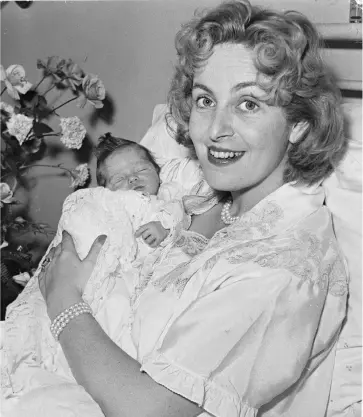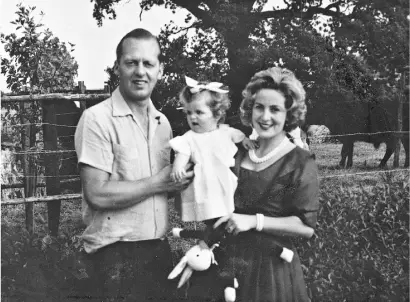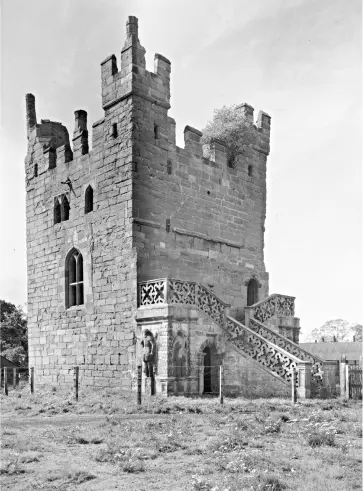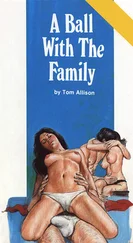Evelyn admitted freely – almost proudly – that he was a cultural philistine, and this would bring him into sharp conflict with Isabella, who grew up as a child yearning for the lost beauty and glamour of Doddington Hall, ever-visible just across the fields.
By 1955, with Doddington running successfully, Evelyn, now aged 40, married Helen Shore. The daughter of a successful Manchester greengrocer family, she was ambitious and clever, and had been called to the Bar in 1951 at the age of 21. Evelyn had in fact been briefly married before, to Elizabeth Cholmondley, so he and Helen had to content themselves with a service of blessing at St Simon the Zealot’s church in Chelsea in 1955.
At the time of Isabella’s birth, Evelyn was 43 and Helen 28. Isabella was born three years after the marriage. Julia was born in 1961 – and then in 1962 the longed-for son and heir, John Evelyn, finally arrived.
The birth of a son settled all the inconvenient questions of inheritance that had been lurking unspoken in the background following the birth of the two girls, Isabella and Julia. It was quite clear now what would happen to Doddington Park – it would pass to John on his father’s death. He may not have been able to afford to live in the splendour of the big house, but the prospect of a male heir redoubled Evelyn’s determination to work at his farm. After a generation of scandal and financial disaster, it seemed that things might finally be starting to turn the corner for the Delves Broughtons.

Newborn Isabella at the London clinic with her mother, who has had her make-up and hair done, which Issie later strongly approved of.
One can understand, then, why the loss of Johnny was so devastating. Evelyn belonged to an age and a class which valued males more highly than females. He did little to spare his grieving daughter’s feelings on this account.
After Johnny’s death, he considered leaving Doddington Park to his closest male relative, Simon Fraser, Master of Lovat, the eldest son of his sister Rosie, and himself in line to inherit from his father, Lord Shimi Lovat. But then Evelyn did some research on some family assets managed by his nephew and was not impressed. Simon was struck off the list.
Another possible beneficiary, he announced to Helen when he came down to breakfast one morning, was Trinity, his old college at Cambridge. He had known happiness there, he said. His three daughters, sitting there eating their cornflakes, were not considered at all.
There was a curious dichotomy in his relationship with Isabella – and all his daughters – for while, ultimately, he betrayed them and badly let them down, there were tender moments of affection. Isabella often accompanied Evelyn on his agricultural rounds, for example, an important ritual that bonded her closely to her father and allowed her to feel loved by him. From the age of 14 she would drive along the internal farm roads to pick him up for lunch every day in the battered old farm car. And Evelyn was, to his credit, not always quite as distant to his children as many upper-class fathers of the age. As her father’s friend Major Peter Ormerod recalled, Evelyn would dress up as Santa Claus at Christmas parties at the house and distribute presents to the children – and to the mothers give ‘out of his sack a half bottle of champagne’.

Isabella with her mother and father, at the gardener’s cottage. In the background you can see the beef cattle.
Evelyn was not a bad man. His great fault was that he was weak.
CHAPTER FIVE
Poor Relations
Even as a child, Isabella was bedevilled by financial insecurity. She undoubtedly picked up her almost existential anxiety about money from her father, who, when he wrote to her at boarding school, would put in brackets next to each person’s name the total number of acres of land which they owned.
Issie measured herself against the wealth of others and found she came up wanting. She keenly felt the part of poor relation. While the Cholmondleys, for example, still lived in splendour in their very own castle, with a retinue of uniformed servants, the Delves Broughtons, by comparison, were holed up in the hated gardener’s cottage while the main house was occupied by a school. There were butlers and gardeners, to be sure, but the set-up was all too obviously being run on a shoestring by comparison to their far richer neighbours. Evelyn’s proud boast that the family had once been able to walk fourteen miles without straying off their own property made matters, if anything, even worse.
The gardener’s cottage so despised by Issie was, in fact, a perfectly agreeable and spacious four-bedroom house. Yet even today, with the once-magnificent big house boarded up in the distance, it still looks out of place, a curiously suburban, almost hacienda-style structure, parked incongruously next to a tumbledown pink sandstone castle tower dating back to medieval times.
Issie loved to play in this perilous, weed-filled tower, conducting dramatic re-creations of medieval rites and myths with her sisters as willing or unwilling participants, and it was an important part of the family’s history. At the Battle of Poitiers in 1356, John de Delves fought valiantly and he was later knighted by King Edward III and granted a licence to crenellate and fortify the tower. The tower was a formative element in Issie’s medieval aesthetic. Years later, the tower would be the inspiration for a ‘castle hat’ designed by one of Issie’s most famous discoveries, the milliner Philip Treacy.

The medieval castle in the grounds of Doddington Park, where Issie spent much time playing as a child.
The Broughtons had an-old fashioned disregard for modern health concerns. Isabella grew up enjoying fresh, unpasteurised, creamy milk straight from the house cow. Their farm manager, worried about the risk of catching tuberculosis, had his milk delivered by the milkman in a sanitised bottle. Throughout her life, Isabella would insist on the richest, full-fat milk.
Another family indulgence was cigarette smoking. Evelyn and Helen smoked heavily, though Evelyn eventually had to give it up when he began suffering bad emphysema. Married to me, Isabella would start smoking at breakfast – sometimes chain-smoking five in a row – ignoring my pleas and entreaties that it was damaging her health.
‘Detmar, you cannot talk, you smoke cigars,’ she would say airily, clouds of smoke billowing out from under her latest Philip Treacy hat.
‘But not for breakfast, Issie,’ I would retort, gasping for air. ‘And anyway, cigars are good for you – look at Churchill and Castro.’
Growing up at Doddington, Isabella often heard stories from the locals of her grandmother Vera’s menagerie at Doddington. Vera had kept a dazzling array of exotic animals, including Carroway birds, ostriches and honey bears, which would often escape to the village from the cages that can be seen at Doddington House to this day. Once a bear had to be lured down from the church steeple with pots of honey.
Isabella’s last memory of her beloved grandmother Vera was being with her while watching the news coverage of the assassination of Bobby Kennedy at her first-floor flat at 51 Eaton Square. Shortly afterwards, Vera died. When Issie and I were first married we lived a few hundred yards away from Eaton Square in Elizabeth Street, and when she was upset with me Isabella would go and sulk in the doorway at 51 Eaton Square, beneath Granny’s old flat.
Читать дальше















